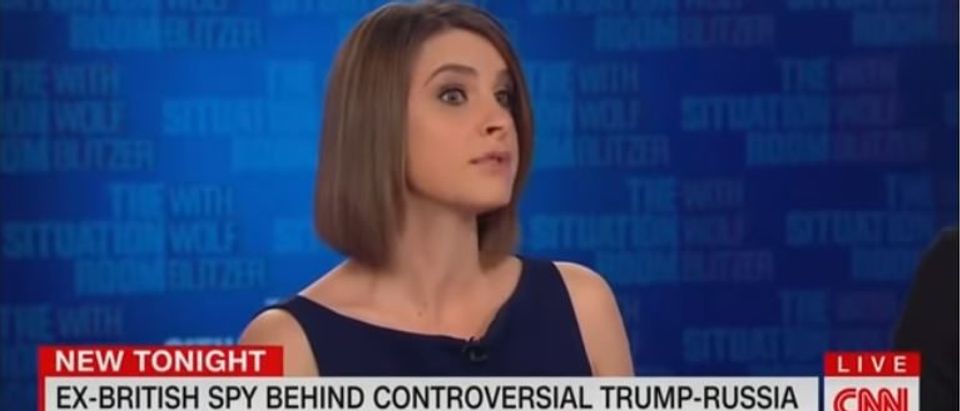A CNN legal analyst who promoted multiple debunked theories related to Russian involvement in the 2016 election cycle will be joining the Justice Department.
Susan Hennessey will be joining the Justice Department’s National Security Division, she announced on Twitter. Hennessey previously served in the Office of General Counsel in the National Security Agency during the Obama administration, and edited the Lawfare legal blog.
I’m very honored to be joining the extraordinary team at the Department of Justice in the National Security Division. Thank you for all the kind words. (And a huge thanks to the folks at WH PPO, agency WH liaisons and HRs who are working night and day to staff this government.)
— Susan Hennessey (@Susan_Hennessey) May 10, 2021
Hennessey promoted allegations of Russian collusion with the Trump campaign, including the debunked Steele Dossier, on CNN, Lawfare and Twitter. She deleted hundreds of tweets about the dossier and collusion theories, multiple users noted.
Hey @Susan_Hennessey, why did you delete this along with hundreds of other Russiagate tweets? https://t.co/sGenwhZXXT pic.twitter.com/qd0d16DcQM
— Caleb Hull (@CalebJHull) May 10, 2021
Already deleted
— Noam Blum ???? (@neontaster) May 10, 2021
Hennessey promoted the Steele Dossier in a 2017 article, co-written with Benjamin Wittes, titled “Why Are The Trump Allegations Hanging Around When They Haven’t Been Substantiated?” Hennessey and Wittes argued that the FBI’s investigation of the Steele Dossier’s claims was proof of its veracity.
“The intelligence community simply does not concern itself with every crazy allegation against a sitting or incoming President that might be circulating or out there in the ether,” they wrote. “There is, in short, something significant about the fact that these allegations, given that they have not been validated, are not part of the giant compost heap of things the intelligence community simply ignores.”
They further claimed that the fact that the FBI obtained a Foreign Intelligence Surveillance Act (FISA) warrant against Carter Page “mean[t] that the FBI has developed a lot more evidence than just this private dossier on the point.”
The FBI’s FISA application, released following a Freedom of Information Act request, relied heavily on the Steele Dossier. An inspector general report found that the dossier “played a central and essential role in the FBI’s and Department’s decision to seek the FISA order” against Page. (RELATED: MSNBC Panel Admits Mueller Report ‘Undercuts Almost Everything’ In Steele Dossier)
Hennessey later defended Steele and the FBI during a 2019 CNN appearance. “Let’s keep in mind, what’s important is not whether or not Christopher Steele had good or bad information. What’s important is what the FBI did with that information,” she said.
“People give tips to the FBI all the time. Sometimes anonymously, sometimes from disreputable sources, sometimes from highly credible sources. I think some of the president’s supporters are hoping that if Steele can’t come up with answers defending his information, that’s going to impeach the FBI generally.”
Hennessey also argued that the indictment of longtime Republican operative and Trump confidante Roger Stone for lying to Congress and witness tampering was proof “of the larger story of Russian interference in the 2016 election and the Trump campaign’s engagement with that effort.”
Robert Mueller later wrote in his final report that his Special Counsel “investigation did not establish that members of the Trump Campaign conspired or coordinated with the Russian government in its election interference activities.” (RELATED: Here’s Everything We Know About Roger Stone, ‘Person 1’ And ‘Person 2’ Following Mueller Indictment)
Hennessey is one of multiple Biden appointees who promoted conspiracy theories associated with Russiagate.
Undersecretary of Defense for Policy Colin Kahl published an essay in Foreign Policy in which he claimed that the evidence was “irrefutable” that “Trump, his associates, and Republican leadership more broadly conspired to give Moscow a pass despite (or perhaps because of) Russia’s attack on our democracy.” (RELATED: Retired General Leading Capitol Review Has A History Of Peddling Far-Left Conspiracy Theories)
Director of National Intelligence Jake Sullivan, who served as a foreign policy advisor to Hillary Clinton during her tenure as Secretary of State and during her 2016 presidential campaign, promoted a story that the Trump Organization had a private server connecting it to a since-sanctioned Russian bank. Mueller testified to Congress in 2019 that the story was inaccurate.
Victoria Nuland, the Undersecretary of State for Political Affairs, played a key role in disseminating the Steele Dossier within the Obama administration. She was criticized by an FBI agent for requesting a meeting with Steele. Like Hennessey, Nuland spent most of the Trump years at the Brookings Institute.


